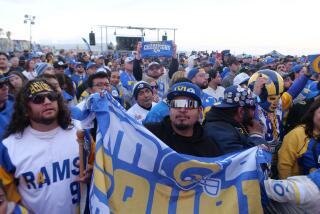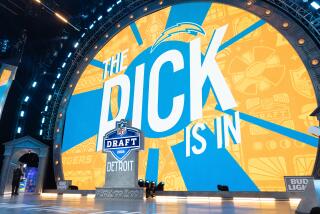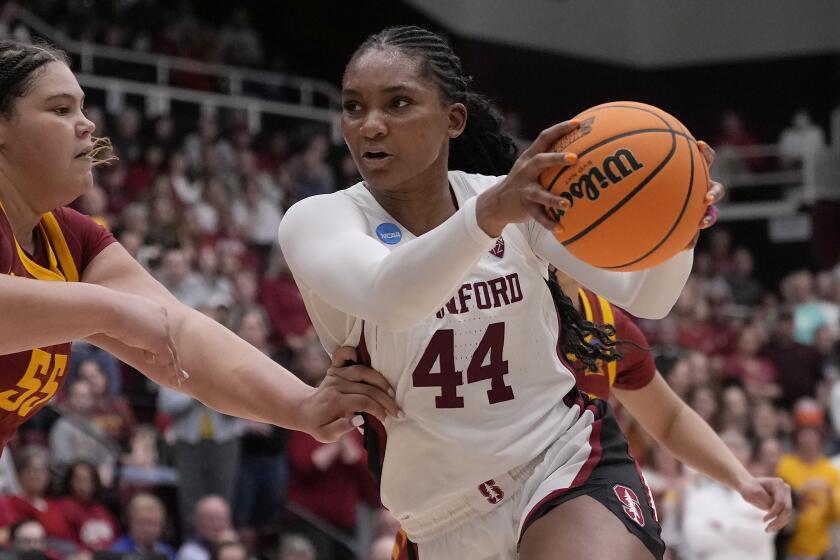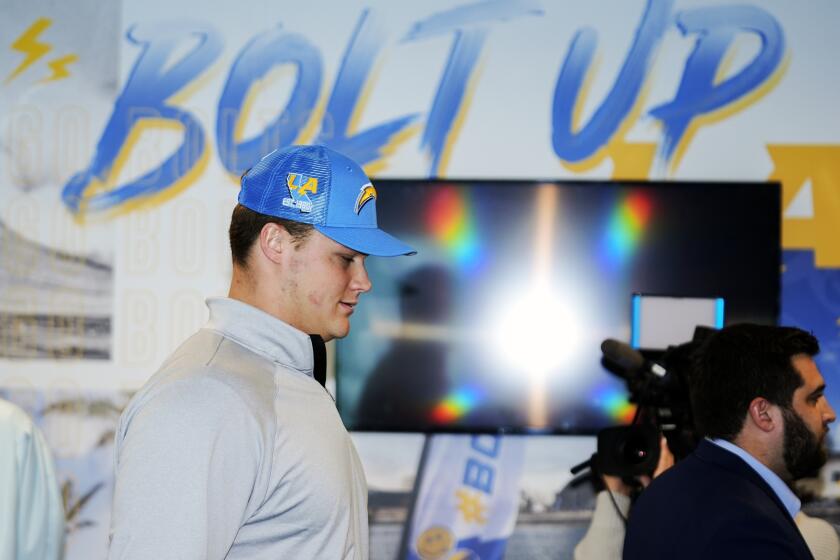BCS basket cases
The much-maligned Basketball Championship Series standings spit out a title-game matchup Sunday and, for a change, the system may have, sort of, gulp, worked?
Not that the BCS was spared the usual “say what?” -- that much is a given in a sport that refuses to decide its champion with a tournament.
It’s good to be an Ohio State Buckeye today, though, and a Kansas Jayhawk.
Those two storied basketball programs finished first and second in the BCS standings and will meet April 2 in Glendale, Ariz., for the national title.
The players should be well-rested.
“This proves the BCS works,” Big Ten Commissioner Jim Delany said on a conference call. “This proves we don’t need a playoff.”
Some folks in Gainesville, Fla., however, think they have been sold swampland.
Ohio State was a runaway No. 1 in the final standings with 99.92 points, and No. 2 Kansas edged out No. 3 Florida, the defending national champion, by a margin of 92.51 to 92.46.
“We can’t defend our title because of five one-hundredths of a point?” Florida Coach Billy Donovan asked. “And you call this a fair system?”
One Florida congressman has already threatened to introduce a bill to outlaw the BCS (note: it was tried before in Texas, in football, but legislation was dropped the year Texas made its run to the BCS title.).
Kansas was clearly the people’s choice for No. 2 this year, so strong in both human polls that it was able to survive a No. 11 ranking in the Ratings Percentage Index, the computer component used in the three-pronged BCS formula.
Florida was No. 3 in the polls and No. 6 in the RPI.
Florida will argue its conference, the Southeastern, was ranked No. 2 in the RPI while Kansas’ conference, the Big 12, was seventh, one spot below the Missouri Valley.
Official BCS response: take it up at our spring meetings.
North Carolina finished fourth in the final standings, with 91.70 points, followed by UCLA, Memphis, Wisconsin, Georgetown, Pittsburgh and Texas A&M.;
Memphis, a member of a non-BCS league, Conference USA, earned an automatic BCS “basket bowl” bid by finishing in the BCS top 12.
So the final “basket bowl” lineup is set.
The Rose Basket, which lost No. 1 Ohio State to the title game, gets to replace its Big Ten anchor with Wisconsin.
The Badgers will meet Oregon, which clinched the Rose bid by winning last weekend’s Pacific 10 Conference tournament.
“We’re thrilled to keep our traditional and geographical matchup,” Rose Basket chief executive Mitch Dorger said.
The Fiesta Basket will get at-large UCLA vs. at-large Memphis, the Sugar will pair Florida against at-large Texas A&M;, and the Sugar will feature North Carolina against Georgetown, a rematch of 1982’s “mythical” national title game that introduced the basketball world to a young Michael Jordan.
UCLA has to be kicking itself.
Two weekends ago, the Bruins were No. 2 in the BCS and appeared headed for a title showdown with Ohio State.
But late-season losses to Washington and California, two unranked teams, knocked UCLA to the Fiesta.
What cruel irony.
In 1998, the UCLA football squad needed only a late-season victory at Miami to clinch a spot in the first BCS national title football game, played that year in the Fiesta Bowl.
If only, against Miami, UCLA had brought its tackle box.
Maybe those BCS bosses aren’t kidding when they say, in college basketball, it’s all about the regular season.
Basketball purists will continue to clamor for a playoff.
Think of all those UCLA teams coached by John Wooden that had to settle for “mythical” national titles because the top-ranked Bruins were contracted to play the Big Ten champion in the Rose Basket?
Donovan said the BCS system “needs to be nuked” despite the fact the Florida football Gators won last season’s national title after edging out Michigan by decimal points for the No. 2 BCS spot.
Donovan advocates a “tournament format” that might involve as many as, get this, 64 teams.
Dream on, right?
The Big Ten’s Delany, a defender of the BCS, argues, “When will our student/athletes go to school?”
The controversial BCS system was developed in 1998 in an effort to pair No. 1 and No. 2 in a championship game.
Before that, conference champions were bound to specific “basket” bowl games, causing numerous split titles.
The BCS standings formula, which has been tweaked more than the carburetor on your old jalopy, is now composed of the Associated Press poll, the USA Today coaches’ poll and the RPI.
This year’s new “double dribble” format created a fifth BCS basket bowl to open up two more at-large possibilities for mid-major conferences that had claimed the sport was a monopoly.
Only the conference tournament winners of the six BCS conferences earn automatic bids to basket bowls.
So, will there ever be a playoff in college basketball?
Don’t hold your breath.
College presidents, citing lost class time, have for years resisted the idea of a national tournament for Division I despite the fact there are playoffs at all other levels.
Conference commissioners continue to insist a tournament in March would dilute college basketball’s “fantastic” regular season.
Regular-season ratings for college basketball have never been better.
“Would a game in November mean as much if you knew both teams were going to make something called the NCAA tournament?” SEC Commissioner Mike Slive wondered.
Some are convinced a tournament would destroy the complicated bowl labyrinth that has evolved since James Naismith’s Peach Basket Bowl first debuted in 1902.
How many basket bowls, though, are too many?
This year’s Phog Allen Classic was the 98th certified by the NCAA, meaning more than half of the major basketball schools will play in a bowl this year.
The joke is there will be more nets cut this year than by dory men in Boston Harbor.
No one would deny the Basketball Championship Series has caused as many headaches as it has offered solutions:
The Associated Press returned to the formula after pulling out three years ago following a conflict-of-interest ruckus that involved one voter’s admitting he voted his alma mater No. 1 a week after writing a $30,000 check for the new arena fund.
The BCS replaced the AP with the ill-fated and short-lived Nike Poll, comprised of a panel of sneaker executives.
Who couldn’t have guessed that would end with a lawsuit filed by Sonny Vaccaro?
How about the year ESPN announcer Dick Vitale threatened to sit on the rim at Cameron Indoor Stadium unless Duke was elevated to No. 1 in the BCS?
Or the year Auburn went 32-0 but couldn’t play for the title because it finished No. 3 in the final BCS standings?
Not that it stopped the coach from ordering national title rings anyway.
Or the year Nebraska missed all its three-point attempts in a 62-36 loss to Colorado, the day after Thanksgiving in 2001, but still got a big basket bid?
Or the year Pac-10 Commissioner Tom Hansen threatened to pull his league out of the BCS unless Oregon State got in?
You can go on and on.
“It’s an imperfect system,” said former SEC commissioner Roy Kramer, co-creator of the BCS. “But it is a system.”
Kramer pointed out that, without increased access provided by the BCS, a mid-major such as Utah never would have earned a trip to the Fiesta Basket in 1998. That team, coached by Rick Majerus, earned an automatic bid by finishing No. 6 in the final standings.
“Does anyone really believe,” Kramer said, “that Utah deserved to play Kentucky for the national title that year?”
As we’ve noted in this space for years, you can cry for a playoff in basketball so long as you realized it’s not going to happen.
The BCS is in the second year of a four-year deal it signed with the Indoor Network.
School presidents remain opposed to a full-blown “tournament” but remain open to extending the season by one game.
BCS officials are calling this the “one-plus-one” option.
But even the chances of that passing are, one BCS source confided, “a three-point attempt, blindfolded, from half court.”
So maybe the BCS didn’t mess things up royally this year.
But there’s always next year.
*
(BEGIN TEXT OF INFOBOX)
The formula
A percentage of total points in the AP and ESPN polls plus two times the percentage of points in the RPI rankings. Divide that number by four and multiply by 100. A perfect score is 100 points:
Team Points
1. Ohio State 99.92
2. Kansas 92.51
3. Florida 92.46
4. North Carolina 91.70
5. UCLA 87.91
Team Points
6. Memphis 87.82
7. Wisconsin 87.42
8. Georgetown 84.43
9. Pittsburgh 76.69
10. Texas A&M; 74.68
Team Points
11. Southern Ill. 70.24
12. Oregon 68.18
13. Texas 66.23
14. Nevada 62.26
15. Wash. St. 61.93
*
IF THE BCS RAN COLLEGE BASKETBALL
--
BCS TITLE GAME
* Ohio State vs. Kansas: Some think Ohio State may be the most storied program that hasn’t won a national title since 1960, when Bob Knight was a benchwarmer. Kansas is a storied program that hasn’t won it all since 1988.
ROSE BASKET
* Oregon vs. Wisconsin: Oregon will bring the high-end Pinot Noir and Wisconsin will bring the cheese. What a combination -- all this game needs is a box of crackers. This is the one year in four the Rose doesn’t regret joining the BCS.
FIESTA BASKET
* UCLA vs. Memphis: Just as USC did in football, UCLA will have to forget about blowing its chance for the national championship and concentrate on bouncing back in this “fallback” bowl.
SUGAR BASKET
* Florida vs. Texas A&M;: Florida would rather be in Arizona, trying to do another big number on Ohio State in Glendale, but this matchup against Texas A&M; could be the most exciting in the BCS lineup.
ORANGE BASKET
* North Carolina vs. Georgetown: You wake up on selection day and this game falls in your lap. How often will they show that wayward Fred Brown pass in ’82 that clinched Dean Smith’s first “mythical” NCAA title?
More to Read
Get our high school sports newsletter
Prep Rally is devoted to the SoCal high school sports experience, bringing you scores, stories and a behind-the-scenes look at what makes prep sports so popular.
You may occasionally receive promotional content from the Los Angeles Times.







